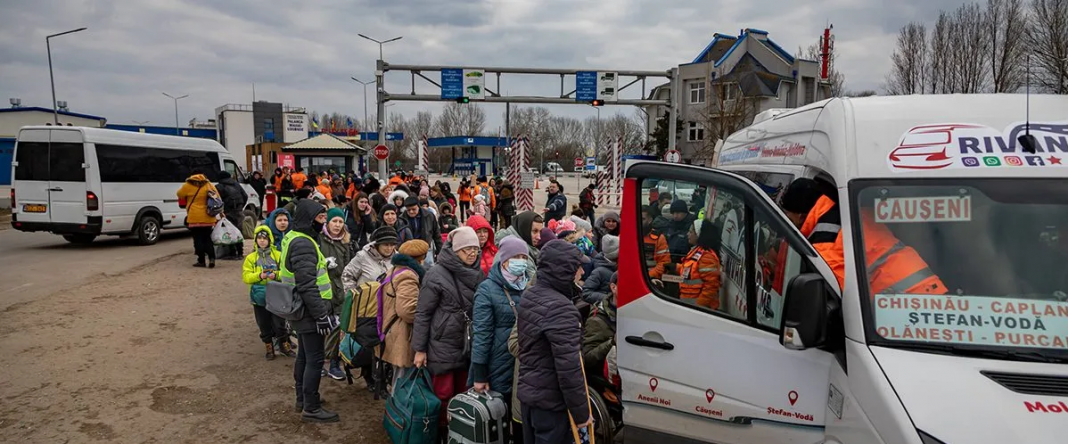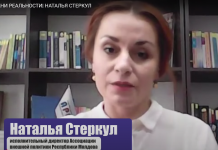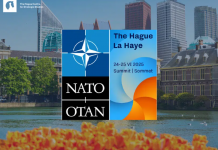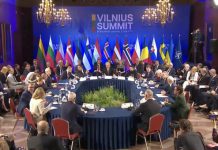Moldova, A country in the heart of Europe, its current leadership and first and foremost its people, opened not only its borders but also their homes for the suffering neighbours. The war in Ukraine has challenged the Eastern European security architecture, emphasizing the need to take decisive steps towards granting a clear European perspective to the Associated Trio countries.
The prospect of the Associated Trio countries’ accession to NATO and/or the EU, long regarded in these countries themselves as a key to ensuring security and prosperity, is seen as posing an existential threat by Russia. The controversy “institutions vs. geopolitics” or “EU vs. Russia”, viewed before February 2022 as a strictly political dilemma, has now been transformed into a conventional war in Ukraine with direct implications for adjacent countries and for Europe as a whole.
The ongoing war in Ukraine both underlines the imperative of adapting the European security concept to reflect the vital role played by the partner countries in Eastern Europe and shines a spotlight on destructive dependencies, and specifically dependencies on Russian gas and money.
The spectre of war
The Republic of Moldova has been faced with the very real possibility of a military conflict in the Eastern European region for over 30 years, confronted, as it is, with Russian troops on its territory – the Operational Group of Russian Forces (OGRF) in the Transnistrian region. The 1992 war in Moldova, as well as the position and actions taken by the Russian Federation during the negotiations, the 2008 war in Georgia, the annexation of Crimea in 2014 and the secessionist movements in Donbas: all of these, were harbingers of large-scale violence in the Eastern European region, the only question was when and where the violence would erupt.
Nonetheless, the memories of the atrocities of World War II, as well as the peace and prosperity being enjoyed in Europe, and specifically in the European Union, allowed vigilance to wane, even making the idea of a potential war in the heart of Europe appear inconceivable. Though the worrying political and social developments in Russia drew attention and discussions on the need for a renewed security architecture in Europe which would accommodate Russia’s “needs and demands” were held, the suggestion that a massive Russian military attack might be in the offing did not sound convincing enough. Even in the face of clear warnings that the Russian Federation intended to launch a military attack on Ukraine, it was still hard to believe that “the moment” that peace in Europe came to an end had actually arrived.
European perspective
The Russian invasion of Ukraine generated the momentum propelling the three associated countries of Moldova, Georgia and Ukraine to sign a formal application for EU membership. Once Ukraine had lodged its own application in late February, expectation ran high that Moldova’s President Maia Sandu would swiftly follow suit, given that she was elected on a pro-European platform and that the war in Ukraine poses an existential threat for her country as well.
Potential candidate status is viewed as the only opportunity to ensure peace, stability and economic recovery in the region. Though the war has not yet ended – Ukraine is subject to heavy and continuous attacks by Russian forces – it is already clear that the conflict will have severe impacts on Moldova’s economic and social well-being. Moldova has already begun to seek new export and import markets due to the impossibility of continuing “business as usual” with Ukraine, Russia and Belarus. According to the Moldovan foreign minister, Nicu Popescu, we “…can easily look ahead at a lost decade in terms of democratic consolidation and economic development for Ukraine, for Moldova.”
A clear European perspective for Moldova, Georgia and Ukraine at this particular point in time would carry a double significance. Firstly, it would reinforce the right of these countries to exercise their sovereign choice and serve as an acknowledgement of the continuous respect for international law, norms and principles. Secondly, by offering the prospect of membership, the European Union could demonstrate its unity and power, and that it stands ready to protect the European values upon which it is based. Given that applications for membership have been made, the granting of candidacy status would be a major step towards conceptually reshaping European security and a sign of strength, unity and desire to protect peace in Europe by safeguarding the independence, sovereignty and territorial integrity of the partner countries. A hesitant European Union would encourage the Russian Federation to continue its “geopolitical and imperialistic” Novorossiya plan, through either hybrid or conventional warfare beyond Ukraine.
Despite the recent statements by Ukraine’s Foreign Minister Dmytro Kuleba, who pleaded for a fast track to EU membership for his country alone, suggesting that Moldova and Georgia’s failure to align with the sanctions against Russia indicated that they are unwilling to make a genuine contribution towards security in Europe, the EU is still seen to regard the three countries as a group and to appreciate the delicate nature of the security situations of its Eastern partners. Both Moldova and Georgia have experienced war on their territory, both have been facing territorial secessionist movements backed by the Russian Federation for more than 30 years and both continue to be dependent on Russia in crucial areas, such as energy supplies or trade. Moreover, while Moldova’s constitutionally enshrined military neutrality limits its scope for military action, that same neutrality is responsible for enhancing the country’s resilience and capacity to act as a humanitarian hub: Moldova has stepped up to take responsibility in a major regional security crisis situation and provided refuge to huge numbers of Ukrainians.
Coping with the refugee crisis
In the first 19 days of the war in Ukraine, Moldova received over 328,000 refugees and their numbers have been increasing hour by hour. At the time of writing, about 101,000 of these refugees remain in Moldova and a bit more than 48,000 of them are minors. In relative terms, Moldova is sheltering 4,124 refugees per every 100,000 of its population, a proportion unmatched elsewhere in the region. Put differently, the number of Ukrainian refugees in the Republic of Moldova currently amounts to 4% of the country’s population. This is more than six times the country’s estimated capacity. [Effective 15th March]
Since the first day of the war, tremendous efforts have been made to mitigate the refugee crisis and cope with the largest humanitarian operation in the region, both on the part of the Moldovan authorities and on the part of ordinary citizens. Ukrainian refugees have found shelter in refugee centres and in private accommodations or flats generously provided at no cost by Moldovan citizens. The Moldovan authorities list 166 refugee centres, 80 of which have been accredited by the National Agency of Social Assistance (ANAS); businesses, NGOs, or other entities have opened the others. The Moldovan government is currently covering one-third of the costs for feeding and accommodating each refugee, amounting to about 1.1 million USD per day. Though Moldova has demonstrated an unanticipated capacity to mobilise both institutionally and in society to respond to the humanitarian needs of Ukrainian citizens, it is quickly running out of options for providing comfortable shelters and care for refugees. Foreign Minister Popescu recently described his country as being in urgent need of additional resources from foreign partners in terms of equipment, financial aid and help with the relocation of refugees as Moldova is rapidly “approaching the breaking point”.
Victoria Rosa is an expert in international relations, European affairs, security & defence, conflict studies & gender issues, civil society development, with a particular focus on EaP countries.







